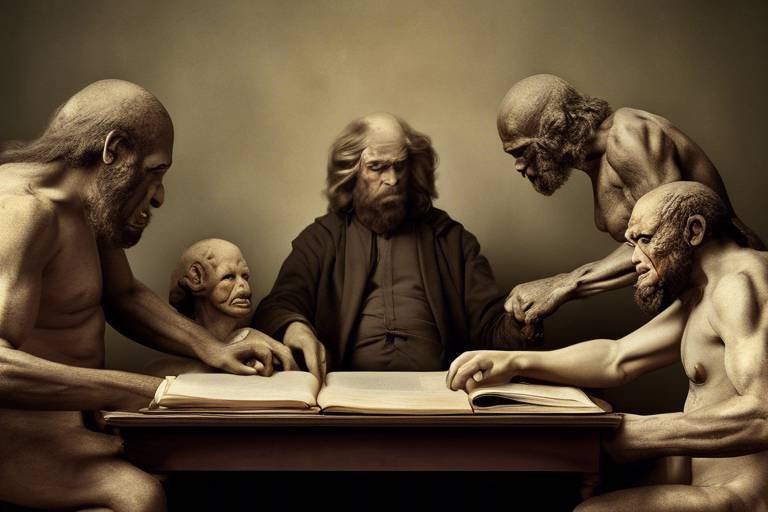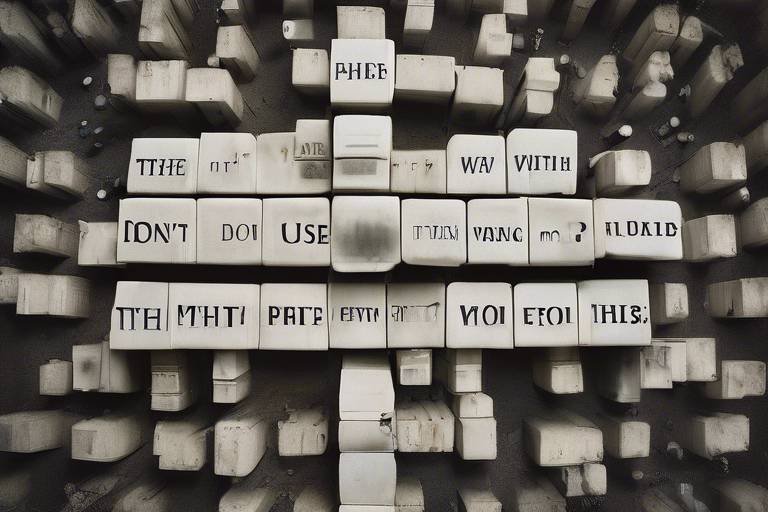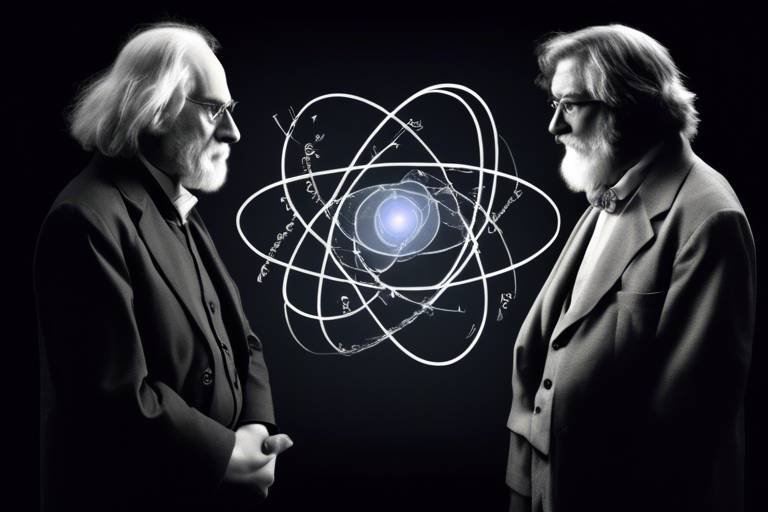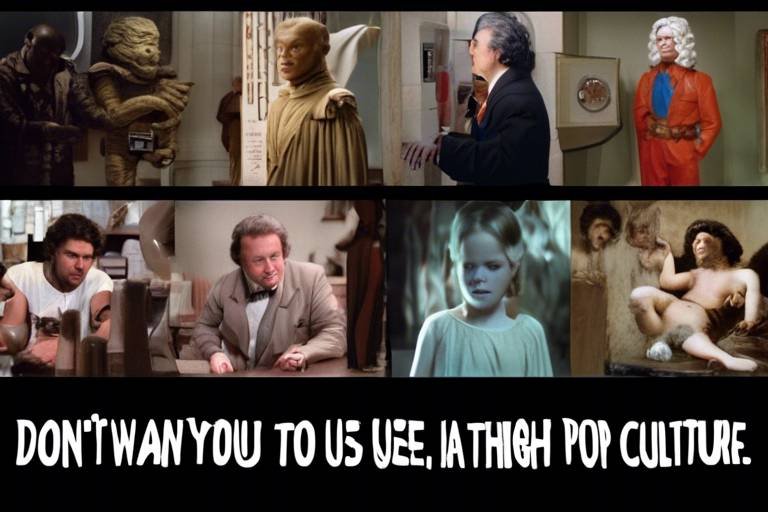Can There Be Morality Without Religion?
This article explores the complex relationship between morality and religion, examining whether ethical principles can exist independently of religious beliefs and the implications of such a stance on society and individuals.
Understanding the essence of morality is crucial. Morality can be seen as a set of principles that guide us in distinguishing right from wrong, good from bad. But what if we strip away the religious context? Can we still find a foundation for moral behavior? Many philosophers argue that morality is not solely derived from religious teachings. Instead, it can be grounded in human experiences, societal norms, and rational thought. This opens up a fascinating discussion about the nature of ethics and how they can exist in a secular world.
A look at how morality has evolved throughout history reveals a rich tapestry of thought. From ancient civilizations that relied on mythological narratives to modern secular philosophies, the evolution of ethical systems is a testament to humanity's quest for understanding. Key thinkers, such as Aristotle, Kant, and Mill, have contributed to this discourse, providing frameworks that allow for moral reasoning outside of religious contexts. Their ideas illustrate the diversity of ethical systems over time and challenge the notion that morality is inherently tied to religion.
This subsection examines prominent secular ethical theories, such as utilitarianism and deontology, and how they provide frameworks for moral decision-making without reliance on religious doctrines. Each of these theories offers a distinct approach to understanding ethics. Utilitarianism, for instance, emphasizes the outcomes of actions, while deontological ethics focuses on the inherent rightness or wrongness of actions themselves. Understanding these frameworks can help us navigate moral dilemmas in a secular context.
Utilitarianism is a consequentialist theory that suggests the morality of an action is determined by its outcomes. The primary principle is to maximize happiness and minimize suffering. Imagine a scale where every action you consider weighs its potential benefits against its possible harms. This approach can guide individuals in making ethical choices that prioritize the greater good, even in the absence of religious directives.
On the other hand, deontological ethics emphasizes duty and rules over consequences. This theory posits that certain actions are inherently right or wrong, regardless of their outcomes. Think of it as a moral compass that directs individuals to adhere to their duties and obligations. This framework is particularly relevant in contemporary discussions about ethics, as it allows for a consistent application of moral principles without relying on religious beliefs.
In today's world, individuals frequently face moral dilemmas that challenge their ethical beliefs. Whether it's issues related to technology, healthcare, or environmental responsibility, navigating these challenges requires a robust moral framework. People often rely on personal values and societal norms to guide their decisions. The question arises: can we find common ground in a secular moral landscape? The answer lies in fostering open dialogue and understanding diverse perspectives.
While examining morality without religion, it's essential to consider the role religion has traditionally played in shaping ethical standards and community values throughout history. Many societies have relied on religious teachings to establish moral codes, creating a sense of shared values and community cohesion. However, as societies evolve, so too do their moral frameworks.
Various religious moral frameworks have contributed significantly to societal ethics. For instance, the Ten Commandments in Christianity and the Five Pillars of Islam provide clear guidelines for ethical behavior. These frameworks often emphasize virtues such as compassion, honesty, and justice. However, conflicts can arise when individuals or groups attempt to impose these religious morals on others, especially in increasingly pluralistic societies.
Critiques of religious morality often center around issues of moral absolutism and dogmatism. Critics argue that rigid adherence to religious doctrines can stifle ethical reasoning and open dialogue. Moreover, as secular viewpoints gain traction, the challenge becomes how to engage in moral discourse without relying on religious authority. This is crucial for fostering a more inclusive society that respects diverse perspectives.
The potential consequences of a secular moral framework on society are significant. A morality without religion can influence laws, social cohesion, and individual behavior in modern contexts. For instance, secular ethics may lead to more flexible laws that adapt to changing societal values. Additionally, it encourages individuals to take responsibility for their moral choices, fostering a sense of personal accountability.
- Can morality exist without religion? Yes, many ethical frameworks operate independently of religious beliefs.
- What are some secular ethical theories? Prominent theories include utilitarianism and deontology.
- How does religion influence morality? Religion often provides a framework for ethical behavior and shared community values.
- What are the critiques of religious morality? Critics point to issues like moral absolutism and the stifling of ethical discourse.

The Nature of Morality
Understanding the essence of morality is crucial for anyone looking to navigate the complex waters of ethical behavior. Morality, at its core, is about distinguishing between right and wrong, good and bad. But what does that really mean? Is it a universal truth, or is it shaped by cultural, social, and personal influences? To dive deeper, we need to explore various philosophical perspectives that define ethics beyond the confines of religious frameworks.
Many people often equate morality with religion, believing that without a divine authority, ethical principles would crumble. However, this perspective overlooks the rich tapestry of secular moral thought that has emerged throughout history. For instance, philosophers like Immanuel Kant and John Stuart Mill have laid down frameworks that allow individuals to make ethical decisions based on reason and the consequences of their actions rather than religious dogma.
From a secular standpoint, morality can be understood through a variety of lenses. Some argue that morality is inherently human, arising from our capacity for empathy and social cooperation. This view suggests that moral behavior is a product of our evolutionary history, where cooperation was essential for survival. Others contend that morality is a social construct, shaped by societal norms and cultural practices. In this sense, what is considered "moral" can vary dramatically from one society to another.
To illustrate this point, consider the following aspects that contribute to our understanding of morality:
- Empathy: The ability to understand and share the feelings of others often drives moral behavior.
- Social Contracts: Many ethical theories propose that morality arises from agreements made within societies to promote harmony and cooperation.
- Cultural Influence: Different cultures have unique moral codes that reflect their values, traditions, and historical contexts.
Furthermore, the debate over whether morality can exist independently of religion raises intriguing questions. Can we develop a robust ethical framework based solely on human reason and experience? Or do we inherently need the guidance of a higher power to navigate moral complexities? As we continue to explore these questions, it becomes evident that morality, while often intertwined with religion, has the potential to stand on its own, guided by rational thought and human experience.
In conclusion, the nature of morality is a multifaceted subject that invites us to reflect on our values and beliefs. It challenges us to consider not just what we believe is right or wrong, but why we believe it. By examining morality through a secular lens, we can appreciate the diverse ethical systems that exist and recognize the shared human experience that underpins our moral decisions.
- Can morality exist without religion? Yes, many secular ethical theories provide frameworks for moral decision-making independent of religious beliefs.
- What are some secular ethical theories? Prominent secular ethical theories include utilitarianism, which focuses on outcomes, and deontological ethics, which emphasizes duty and rules.
- How do cultural differences affect morality? Cultural norms and values significantly shape what is considered moral behavior, leading to diversity in ethical systems across societies.

Historical Perspectives on Morality
Throughout history, the concept of morality has undergone significant transformations, influenced by cultural, philosophical, and religious developments. Understanding these historical perspectives is crucial to grasp the current debates surrounding morality and its relationship with religion. From ancient civilizations to modern philosophical thought, the evolution of moral frameworks reflects humanity's quest for ethical understanding and the complexities of human behavior.
In ancient societies, morality was often intertwined with religious beliefs. Many early moral codes, such as the Code of Hammurabi or the Ten Commandments, were presented as divine laws, establishing a connection between ethical conduct and religious obligation. These laws served not only as guidelines for personal behavior but also as a means to maintain social order. The moral teachings of influential figures like Confucius and Socrates further shaped ethical thought, emphasizing virtues such as honesty, integrity, and justice. Their ideas laid the groundwork for later philosophical inquiries into morality, often challenging the notion that ethics must be rooted in religious doctrine.
As we moved into the Enlightenment period, thinkers like Immanuel Kant and John Stuart Mill began to propose secular ethical theories that could stand independently of religious beliefs. Kant's deontological ethics introduced the idea that moral actions are based on duty and adherence to universal principles, while Mill's utilitarianism focused on the outcomes of actions, advocating for the greatest good for the greatest number. These frameworks marked a significant shift, suggesting that morality could be derived from reason and human experience rather than divine command.
In the 19th and 20th centuries, the rise of secular humanism further propelled the idea that ethical systems could exist without religious foundations. Figures like Friedrich Nietzsche challenged traditional moral values, arguing for a re-evaluation of ethics based on individual autonomy and societal progress. This period saw the emergence of diverse ethical theories, including existentialism and virtue ethics, which emphasized personal responsibility and character development over adherence to prescribed moral laws.
Moreover, the increasing influence of science and rational thought during this time led to a more empirical approach to morality. Philosophers began to investigate how human behavior could be understood through psychology and sociology, paving the way for a more nuanced understanding of morality that considers context, culture, and individual circumstances. This shift is essential to recognize, as it highlights the complexity of moral decision-making in a rapidly changing world.
As we analyze the historical perspectives on morality, it becomes evident that ethical principles have always been dynamic, shaped by the interplay of various factors, including religion, philosophy, and social evolution. Today, as we navigate moral dilemmas in a secular context, it is crucial to acknowledge these historical developments and understand that morality can indeed exist independently of religious beliefs, offering a rich tapestry of ethical thought that continues to evolve.
- Can morality exist without religion? Yes, many ethical frameworks and philosophies propose that morality can be based on reason, human experience, and societal norms rather than religious beliefs.
- What are some secular ethical theories? Prominent secular ethical theories include utilitarianism, which focuses on the outcomes of actions, and deontological ethics, which emphasizes duty and rules.
- How has morality evolved over time? Morality has evolved through various historical phases, influenced by cultural, philosophical, and religious changes, leading to diverse ethical systems.
- What role did religion play in the development of morality? Religion historically provided moral frameworks and guidelines for ethical conduct, but many philosophers have argued that morality can exist independently of religious teachings.

Secular Ethical Theories
When we talk about , we're diving into a fascinating world where morality is shaped by reason, human experience, and societal needs rather than divine commandments. These theories provide a framework for understanding how we can make ethical decisions based on logic and the consequences of our actions, rather than relying solely on religious texts or doctrines. One of the most compelling aspects of secular ethics is that it promotes a universal approach to morality that can be applied regardless of one’s religious beliefs or lack thereof.
Two of the most prominent secular ethical theories are utilitarianism and deontology. Each offers a unique perspective on how to determine what is right or wrong, and they both have significant implications for how we navigate moral dilemmas in our everyday lives. Understanding these theories can empower individuals to make informed decisions that align with their personal values while contributing positively to society.
Utilitarianism, for instance, is all about the outcomes. The central idea is that the best action is the one that maximizes overall happiness or minimizes suffering. Imagine you're at a party and you have to decide whether to order pizza or sushi for everyone. A utilitarian approach would consider which option would bring the most joy to the largest number of people. This theory encourages us to think beyond our own preferences and consider the greater good, which can lead to more compassionate and inclusive decision-making.
On the other hand, we have deontological ethics, which emphasizes the importance of following rules and duties regardless of the consequences. Think of it like a moral compass that guides you to act according to certain principles. For example, if you believe that lying is inherently wrong, a deontologist would argue that you should tell the truth, even if it might lead to undesirable outcomes. This perspective fosters a sense of integrity and accountability, as it encourages individuals to adhere to their moral obligations without exception.
Both of these theories highlight the rich tapestry of secular moral thought, demonstrating that ethical behavior can flourish outside the confines of religious doctrine. They invite us to engage in meaningful discussions about morality that are grounded in our shared human experience. As we explore these theories further, it becomes clear that secular ethics not only provides a robust framework for decision-making but also encourages a more inclusive dialogue about what it means to live a good and meaningful life.
As we delve deeper into the implications of these theories, we can appreciate how they address modern moral dilemmas. In a world where ethical challenges abound—ranging from environmental issues to social justice—we can rely on secular frameworks to guide our choices. They remind us that morality is not static but rather a dynamic process shaped by our interactions with one another and the world around us.
- What is the main difference between utilitarianism and deontology? Utilitarianism focuses on the outcomes of actions to determine their morality, while deontology emphasizes duties and rules regardless of the consequences.
- Can secular ethics coexist with religious beliefs? Absolutely! Many people find that secular ethics complement their religious beliefs, allowing for a broader understanding of morality that includes diverse perspectives.
- How do secular ethical theories address modern dilemmas? Secular ethical theories provide frameworks that help individuals navigate complex issues by considering the impact of their actions on overall well-being and moral duties.

Utilitarianism Explained
Utilitarianism is a fascinating ethical theory that focuses on the outcomes of actions to determine their morality. At its core, it asks a simple yet profound question: What action will produce the greatest good for the greatest number? This principle, often attributed to philosophers like Jeremy Bentham and John Stuart Mill, emphasizes the importance of consequences in moral decision-making. Instead of adhering to strict rules or duties, utilitarianism encourages individuals to consider the impact of their actions on overall happiness and well-being.
Imagine you're at a community event, and you have a choice to make. You can either donate your time to help organize the event or use that time to volunteer at a local shelter. A utilitarian approach would evaluate which option maximizes happiness not just for yourself but for the community as a whole. This could mean weighing the benefits of a well-organized event against the immediate needs of the shelter. It's a balancing act that requires careful consideration of the potential outcomes of each choice.
Utilitarianism can be broken down into two main branches: act utilitarianism and rule utilitarianism. Act utilitarianism focuses on the specific actions taken in individual situations, assessing each scenario independently to determine which action produces the best results. On the other hand, rule utilitarianism looks at the broader picture, advocating for rules that generally lead to the greatest good when followed consistently. This distinction is crucial because it allows for flexibility in moral reasoning while still aiming for a collective benefit.
One of the strengths of utilitarianism is its democratic nature. It encourages a collective approach to ethics, where the well-being of the majority is prioritized. However, this can also lead to significant challenges. For instance, what happens when the happiness of the majority comes at the expense of a minority? This dilemma raises important questions about justice and fairness, highlighting the potential pitfalls of a purely utilitarian framework.
In practical terms, utilitarianism has been applied in various fields, including public policy, healthcare, and environmental ethics. For example, policymakers often use utilitarian principles to assess the potential benefits and harms of legislation, striving to create laws that promote the overall welfare of society. In healthcare, decisions about resource allocation can also be guided by utilitarian considerations, ensuring that limited resources are used in ways that maximize health outcomes for the largest number of people.
Ultimately, while utilitarianism provides a compelling framework for ethical decision-making, it is not without its criticisms. Detractors argue that it can lead to morally questionable outcomes, such as justifying harmful actions against individuals if it benefits the majority. This tension between individual rights and collective happiness is a central theme in the ongoing debate about the role of utilitarianism in contemporary moral discussions.
In conclusion, utilitarianism offers a pragmatic approach to ethics that emphasizes the importance of consequences. By focusing on the overall happiness produced by actions, it encourages a thoughtful evaluation of our choices in a complex world. However, as we navigate moral dilemmas, we must also remain vigilant about the potential ethical pitfalls that can arise when prioritizing the majority over the minority.
- What is the main principle of utilitarianism?
Utilitarianism's main principle is to maximize happiness and minimize suffering for the greatest number of people. - Who are the key philosophers associated with utilitarianism?
Jeremy Bentham and John Stuart Mill are the most notable philosophers associated with the development of utilitarian thought. - What are the criticisms of utilitarianism?
Critics argue that utilitarianism can justify harmful actions against individuals if it benefits the majority, raising concerns about justice and individual rights. - How is utilitarianism applied in real life?
Utilitarianism is applied in various fields such as public policy, healthcare, and environmental ethics to guide decision-making based on the overall welfare of society.

Deontological Ethics
Deontological ethics, often associated with the philosopher Immanuel Kant, is a moral framework that emphasizes the importance of following rules and duties when making ethical decisions. Unlike consequentialist theories such as utilitarianism, which judge the morality of an action based on its outcomes, deontology focuses on the inherent rightness or wrongness of actions themselves. This means that certain actions are considered morally obligatory, regardless of their consequences. For example, telling the truth is viewed as a moral duty, even if it might lead to undesirable outcomes.
At the heart of deontological ethics is the idea of categorical imperatives. These are universal moral principles that apply to all rational beings and serve as a guide for ethical behavior. Kant proposed that we should act only according to that maxim whereby we can, at the same time, will that it should become a universal law. In simpler terms, before you act, consider whether you would want everyone else to act in the same way. This principle encourages consistency in moral reasoning and promotes a sense of accountability.
One of the key strengths of deontological ethics is its ability to provide a clear and structured approach to moral dilemmas. It offers a framework that can help individuals navigate complex ethical situations by focusing on their duties and obligations. However, this rigid structure can also be a double-edged sword. For instance, in situations where following a rule may lead to harm, deontological ethics can seem inflexible. Imagine a scenario where lying could save a life; deontological ethics would argue against lying, prioritizing the duty to be truthful over the potential positive outcome.
Despite these challenges, deontological ethics remains relevant in contemporary moral discussions. It encourages individuals to reflect on their values and the principles that guide their decisions. Many people find comfort in the idea that certain actions are inherently right or wrong, providing a moral compass in an increasingly complex world. In a society where ethical relativism is gaining traction, deontology stands as a reminder that some moral truths may transcend cultural differences and personal beliefs.
In conclusion, deontological ethics offers a compelling perspective on morality that prioritizes duties and rules. While it may not provide all the answers to ethical dilemmas, it encourages a thoughtful examination of our actions and the principles that govern them. Understanding this framework can empower individuals to make more informed and principled decisions in their everyday lives.
- What is the main focus of deontological ethics?
Deontological ethics focuses on the morality of actions based on adherence to rules or duties rather than the consequences of those actions. - Who is the most notable philosopher associated with deontological ethics?
The most notable philosopher associated with deontological ethics is Immanuel Kant, who introduced the concept of categorical imperatives. - How does deontology differ from utilitarianism?
Deontology differs from utilitarianism in that it prioritizes the inherent rightness or wrongness of actions, while utilitarianism evaluates actions based on their outcomes. - Can deontological ethics lead to moral dilemmas?
Yes, deontological ethics can lead to moral dilemmas, especially in situations where following a rule may result in harm or negative consequences.

Modern Moral Dilemmas
In today's fast-paced world, we are constantly bombarded with moral dilemmas that challenge our ethical compass. These dilemmas often arise in situations where the right course of action isn't clear-cut, leaving individuals to grapple with their values and beliefs. Consider the case of technology and privacy: As we embrace innovations like social media and smart devices, we face questions about how much we should share and how our data is used. Are we sacrificing our privacy for convenience? This conundrum illustrates a modern moral dilemma where personal gain clashes with ethical considerations.
Another pressing issue is environmental ethics. With climate change looming large, individuals and organizations are faced with choices that pit economic growth against ecological sustainability. Do we prioritize immediate profits, or do we take a stand for the planet's future? This dilemma isn't just a matter of personal ethics; it impacts communities and future generations. The choices we make today can lead to either a thriving planet or a desolate one.
Furthermore, the rise of artificial intelligence (AI) presents a unique set of moral questions. As machines become more capable of making decisions, we must ask ourselves: Who is responsible when AI makes a mistake? Should we trust algorithms to make life-altering decisions, such as in healthcare or criminal justice? These questions highlight the need for a robust ethical framework that can guide us through the complexities of technology's role in our lives.
To navigate these dilemmas, many people turn to their personal values, societal norms, and even philosophical theories. For instance, some may lean on utilitarianism, seeking the greatest good for the greatest number, while others might adhere to deontological ethics, emphasizing duty and adherence to rules. The challenge lies in reconciling these differing approaches to create a cohesive moral understanding that can guide us through the murky waters of modern life.
Ultimately, the resolution of these dilemmas often requires a blend of introspection and community dialogue. By engaging with others and sharing perspectives, we can better understand the implications of our choices and work towards solutions that align with our collective values. The journey through modern moral dilemmas is not just about finding answers; it's about fostering a deeper understanding of ourselves and our place in the world.
- What are some examples of modern moral dilemmas?
Examples include issues related to technology and privacy, climate change, and the ethics of artificial intelligence.
- How can I navigate moral dilemmas?
Engaging with your personal values, seeking community dialogue, and exploring philosophical theories can help you navigate these challenges.
- Is it possible to have morality without religion?
Yes, many secular ethical frameworks exist that provide guidance on moral behavior independent of religious beliefs.

The Role of Religion in Morality
When we dive into the intricate relationship between religion and morality, it becomes clear that religion has historically served as a compass for ethical behavior. For many, religious teachings provide a foundation for understanding right from wrong, shaping societal norms and personal values. But what happens when we consider morality outside the confines of religious doctrine? Can ethical principles stand on their own, or do they inevitably rely on the frameworks provided by faith?
Throughout history, various religions have offered moral guidelines that have influenced laws, social behaviors, and community standards. For instance, the Ten Commandments in Christianity and Judaism, the Five Precepts in Buddhism, and the Quranic teachings in Islam have all played pivotal roles in defining moral conduct within their respective cultures. These religious moral frameworks often emphasize values such as compassion, honesty, and justice, which resonate deeply with the human experience.
However, the reliance on religious morality is not without its challenges. As societies evolve and become more pluralistic, the question arises: how do we reconcile differing moral perspectives that stem from various religious beliefs? This diversity can lead to conflicts, especially when laws and social norms are influenced by specific religious doctrines. For example, debates surrounding issues like abortion and same-sex marriage often pit religious moral viewpoints against secular ethical arguments, highlighting the tension between faith-based and reasoned moralities.
Moreover, there are critiques of religious morality that suggest it can lead to dogmatism and moral absolutism. Critics argue that when moral principles are viewed as unchangeable truths dictated by a divine authority, it can stifle critical thinking and ethical development. In a world where moral dilemmas are often complex and nuanced, a rigid adherence to religious texts may not provide the flexibility needed to navigate contemporary issues. This raises an important question: can morality thrive in a secular environment, or is it forever intertwined with religious belief?
Despite these critiques, it’s important to recognize the positive contributions religion has made to moral discourse. Many religious communities actively promote charity, community service, and social justice, demonstrating that moral action can be deeply rooted in faith. The challenge lies in balancing these religious influences with secular ethical frameworks that promote inclusivity and respect for diverse beliefs.
In conclusion, while religion has played a significant role in shaping moral standards throughout history, the conversation around morality is evolving. As we explore the potential for a morality that exists independently of religion, we must consider both the strengths and limitations of religious moral frameworks. Are we ready to embrace a more secular approach to ethics, or will we continue to rely on the teachings of the past? The answer may lie in our ability to foster dialogue and understanding across different moral landscapes.
- Can morality exist without religion? Yes, many secular ethical theories provide frameworks for understanding morality independently of religious beliefs.
- What are some examples of secular moral frameworks? Prominent examples include utilitarianism and deontological ethics, which focus on outcomes and duties, respectively.
- How do religious morals impact laws? Religious morals can significantly influence laws, especially in societies where a particular faith is dominant, leading to potential conflicts with secular values.
- Are religious morals always absolute? Critics argue that religious morals can be dogmatic and inflexible, while others believe they offer timeless truths that guide ethical behavior.

Religious Moral Frameworks
The relationship between religion and morality is a profound one, deeply intertwined throughout human history. Many people argue that religious frameworks are the bedrock of moral standards, providing a clear set of guidelines for right and wrong. These frameworks often stem from sacred texts, traditions, and teachings that have been passed down through generations. For instance, the Ten Commandments in Christianity and Judaism outline fundamental moral principles that have influenced countless lives and societies. But is it possible to derive morality solely from these religious teachings, or can ethical behavior exist independently of them?
Religious moral frameworks typically emphasize the importance of divine command. Followers are taught that moral laws are not merely social constructs but are decreed by a higher power. This belief can create a strong sense of obligation among adherents, as they feel compelled to follow these moral dictates. However, this can also lead to dogmatism, where individuals may adhere to moral principles without questioning their validity or relevance in contemporary society. The challenge arises when individuals encounter moral dilemmas that seem to conflict with religious teachings, prompting a re-evaluation of what is deemed right or wrong.
One significant aspect of religious moral frameworks is their role in fostering community cohesion. Religions often provide a shared set of values and norms that bind individuals together, creating a sense of belonging. For example, in many cultures, communal rituals and moral teachings reinforce ethical behavior among members, promoting social harmony. However, this can also lead to exclusionary practices, where those outside the religious group may be judged or marginalized based on differing moral beliefs.
To illustrate the diversity of religious moral frameworks, consider the following table that highlights key characteristics of several major religions:
| Religion | Core Moral Teachings | Source of Authority |
|---|---|---|
| Christianity | Love thy neighbor, Ten Commandments | Bible |
| Islam | Five Pillars, compassion, justice | Quran |
| Hinduism | Dharma, karma, non-violence (ahimsa) | Vedas, Upanishads |
| Buddhism | Four Noble Truths, Eightfold Path | Teachings of the Buddha |
While these frameworks offer a structured approach to morality, they also raise important questions. For example, can morality be considered absolute if it varies so significantly across different religions? And what happens when individuals begin to question these teachings? As society evolves, many people find themselves navigating the complexities of morality in a secular context, often relying on personal values and societal norms rather than religious doctrine.
In conclusion, while religious moral frameworks have undeniably shaped ethical standards throughout history, the ongoing dialogue between secular and religious morality continues to challenge our understanding of right and wrong. As we explore these frameworks, we must remain open to the possibility that morality can exist outside the confines of religion, driven instead by a shared human experience and the collective pursuit of a just society.

Critiques of Religious Morality
Critiques of religious morality often center around the concept of moral absolutism, which posits that certain actions are universally right or wrong, regardless of context or circumstance. This perspective can lead to a rigid moral framework that may not accommodate the complexities of human experience. For instance, consider the ethical dilemma of lying. In many religious contexts, lying is deemed unequivocally wrong. However, what if lying could save a life? This scenario raises questions about the flexibility of religious moral codes and their applicability in real-world situations.
Another significant critique is the issue of dogmatism. Religious moral systems can sometimes foster an environment where questioning or dissent is discouraged. This can stifle critical thinking and prevent individuals from engaging in meaningful ethical discussions. For example, if a community adheres strictly to a particular religious doctrine, members may feel pressured to conform, even when they personally disagree with certain moral teachings. This can lead to a lack of personal moral agency, where individuals do not feel empowered to make ethical decisions based on their own reasoning.
Moreover, the separation of morality from religion raises important questions about moral motivation. Critics argue that if morality is solely derived from religious teachings, then individuals may only act ethically out of fear of divine punishment or desire for heavenly reward. This transactional view of morality can diminish the intrinsic value of ethical behavior, suggesting that people are only good because they are compelled by their faith. In contrast, a secular moral framework encourages individuals to develop their own ethical principles based on empathy, reason, and societal consensus, rather than relying on external religious mandates.
To illustrate these critiques further, consider the following table that compares religious morality with secular ethics:
| Aspect | Religious Morality | Secular Ethics |
|---|---|---|
| Moral Basis | Divine command and scripture | Reason and human experience |
| Flexibility | Often rigid and absolute | Adaptive and context-sensitive |
| Moral Agency | Limited by doctrinal adherence | Encouraged through personal reasoning |
| Moral Motivation | Fear of punishment or desire for reward | Empathy and societal well-being |
In conclusion, while religious morality has historically played a significant role in shaping ethical standards, its critiques highlight the need for a more nuanced understanding of morality that transcends religious boundaries. By fostering a moral framework grounded in reason and human experience, societies can encourage individuals to engage with ethical dilemmas in a more thoughtful and compassionate manner.

Implications for Society
The implications of a secular moral framework on society are profound and multifaceted. As we navigate through the complexities of modern life, the question arises: what happens when morality is untethered from religious doctrine? In a world where ethical principles are derived from human reasoning rather than divine command, we may see shifts in laws, social cohesion, and individual behavior. These changes can be both liberating and challenging, as they force us to confront the very essence of right and wrong.
One significant implication is the evolution of laws that govern behavior. In many societies, laws have traditionally mirrored religious teachings, establishing a moral baseline that is often unquestioned. However, as secular moral reasoning gains traction, we might observe a transition towards laws that reflect a broader spectrum of ethical considerations. For example, issues like abortion, euthanasia, and LGBTQ+ rights have sparked intense debates, often pitting secular ethics against religious beliefs. As more people advocate for laws based on human rights and personal autonomy, we may witness a gradual shift towards legal systems that prioritize individual freedom over religious mandates.
Furthermore, the absence of a singular religious moral authority can foster a diverse tapestry of ethical perspectives. This diversity can lead to a more inclusive society where various beliefs coexist. However, it can also result in moral relativism, where the lines between right and wrong become blurred. In a world where everyone defines their own morality, how do we ensure social cohesion? This is where the challenge lies: finding common ground amidst differing moral frameworks. A society that embraces secular morality must cultivate open dialogue and mutual respect to navigate these differences effectively.
Individual behavior is another area significantly impacted by a shift towards secular morality. People may feel empowered to make ethical choices based on personal convictions rather than adhering to prescribed religious norms. This newfound freedom can lead to a more authentic expression of values, allowing individuals to align their actions with their beliefs. However, it also raises questions about accountability and the potential for ethical inconsistencies. Without a universal moral compass, how do we hold one another accountable for our actions? This dilemma underscores the importance of establishing a shared understanding of ethics that transcends individual beliefs.
| Aspect | Religious Moral Framework | Secular Moral Framework |
|---|---|---|
| Source of Morality | Divine Command | Human Reasoning |
| Basis for Laws | Religious Teachings | Human Rights and Ethics |
| Social Cohesion | Shared Beliefs | Diversity of Perspectives |
| Individual Accountability | Divine Judgment | Personal Convictions |
As we reflect on these implications, it becomes clear that the relationship between morality and society is intricate and evolving. The transition towards a secular moral framework offers opportunities for growth and understanding, but it also presents challenges that require careful navigation. Ultimately, the question remains: can we create a society that thrives on ethical diversity while fostering a sense of unity and shared purpose?
- Can morality exist independently of religion? Yes, many ethical systems and philosophies provide frameworks for moral reasoning without reliance on religious beliefs.
- What are some secular ethical theories? Prominent secular ethical theories include utilitarianism, which focuses on outcomes, and deontology, which emphasizes duty and rules.
- How does secular morality affect laws? Secular morality can lead to laws that prioritize human rights and individual freedoms, potentially challenging traditional religious legal frameworks.
- What are the challenges of a secular moral framework? The main challenges include ensuring social cohesion amidst diverse beliefs and establishing accountability without a universal moral authority.
Frequently Asked Questions
- Can morality exist without religion?
Absolutely! Morality can thrive independently of religious beliefs. Many ethical frameworks, like utilitarianism and deontology, provide a basis for moral decision-making that doesn't rely on religious doctrines. This shows that humans can develop a sense of right and wrong through reason, empathy, and societal norms.
- What are some secular ethical theories?
Secular ethical theories include utilitarianism, which focuses on the outcomes of actions, and deontological ethics, which emphasizes duties and rules. These theories help individuals navigate moral dilemmas based on rational thought and the impact of their actions on others, rather than religious teachings.
- How has morality evolved throughout history?
Morality has undergone significant evolution over time, influenced by key thinkers and movements. From ancient philosophies to modern secular ethics, the understanding of moral behavior has diversified, showcasing that ethical principles can adapt to societal changes without being tied to religious beliefs.
- What role does religion play in shaping morality?
Religion has historically played a significant role in shaping moral standards and community values. Many societies have relied on religious teachings to define right and wrong. However, as secular perspectives gain prominence, the conversation about morality is increasingly centered on humanistic values and ethical reasoning.
- Are there critiques of religious morality?
Yes, critiques of religious morality often highlight issues like moral absolutism and dogmatism. These critiques argue that rigid adherence to religious doctrines can hinder moral progress and ignore the complexities of human experience. Secular viewpoints challenge these ideas by promoting a more flexible, context-based approach to ethics.
- What are the implications of secular morality for society?
The implications of a secular moral framework can be profound. It may influence laws, social cohesion, and individual behavior. As societies shift towards secular ethics, they may foster a more inclusive environment where diverse perspectives on morality can coexist and thrive without religious constraints.



















